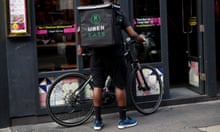A Hermes delivery driver will on Monday tell MPs how the company cut his “gig economy” job after he struggled to hit targets while trying to juggle work with caring for his wife, who was dying of cancer.
Peter Jamieson, 33, a former lorry driver, is one of seven workers who will give evidence to an inquiry into self-employment and the gig economy, which was prompted by a Guardian investigation that revealed some Hermes couriers were paid rates equivalent to less than the minimum wage and others felt forced to work through illness and bereavement.
Frank Field, the chairman of the Commons work and pensions select committee, said thousands of people like Jamieson felt they had been “tricked and maltreated” by big businesses exploiting workers’ flexibility but often not giving them rights or flexibility in return.
The workers giving evidence on Monday were “incredibly brave”, Field explained, as many of them are still currently working for gig economy employers. “They don’t get the national living wage,” he said. “They often just get pushed around told to ‘do this, do that, stay here, wait there’, but then when they want some of the real advantages of flexible working they are told they can’t have it.”
“The employers say ‘if you can’t find someone to cover your round you’re out’. They are just bullied,” Field said.
Jamieson said Hermes, which delivers packages for Amazon and John Lewis, stopped offering him work after he requested to swap shifts so he could hold his wife’s hand at chemotherapy and radiotherapy hospital appointments. Hermes denied his request, instead piling him up with more shifts, before withdrawing all work.
“They told me everyone has problems at Hermes and I would never work for Hermes again … there was no compassion,” Jamieson told the Guardian last year.
Jamieson will tell the work and pensions select committee that he pleaded with Carole Woodhead, chief executive of Hermes UK, to give him his job back. “We have an eight-year-old son called Brandon, who is finding his mum’s illness hard to deal with, and is upset about Tricia losing her hair and having little energy to do as much with him as she used to,” Jamieson told Woodhead in a letter.
His wife, Tricia, who was in her mid 20s, had recently been told she had inoperable cancer and just months left to live. Jamieson’s patchwork earnings amounted to as little as £500 a month after expenses, but the money was essential to help support his Tricia and their young son.
“Tricia was really upset and panicking about the future for me and our son Brandon when she’s gone,” Jamieson said. “It was really uncalled for. It let us know what type of company Hermes is. I couldn’t even buy a bunch of flowers for Tricia. I was asking for help, but I was told the work was my responsibility.”
Jamieson told Woodhead that her company “was aware I was struggling and going through a tough time personally”, but “instead of lessening the burden, [Hermes] increased the volume against my wishes, which was really the last thing I needed”.
Jamieson asked Hermes, which turned over £443m in 2014-15 and made a profit of £29m after tax, to restore even some of his work, saying he “would not let you down again”. Woodhead did not reply to the letter.
The company has since apologised and said: “This kind of behaviour has absolutely no place in Hermes and we are appalled by these claims.”
Two other Hermes delivery drivers, a Deliveroo bike rider and two Uber drivers will also give evidence on Monday. David Dunn, an Uber driver from Glasgow, will tell the inquiry that more than 1,000 Uber drivers in Scotland had their pay delayed by the company.
Field has told Theresa May that the government should listen to workers’ horror stories and guarantee the minimum wage for self-employed workers for companies such as Hermes and Uber.
Field, who has led campaigns in parliament against what he claims is the “sulphurous effect” of the fast-growing gig economy, has proposed a new “national standard of fair work in the gig economy”. He said his fair work proposal would “give the prime minister the tools she needs to craft basic humanity, decency and fairness into the bottom of Britain’s labour market”.
He said an additional 900,000 self-employed positions had been added to the UK workforce since 2010.








